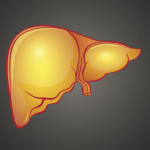People with nonalcoholic fatty liver disease (NAFLD) who regularly took aspirin had less evidence of severe liver damage, as well as a lower risk of progression to nonalcoholic steatohepatitis (NASH) and development of advanced fibrosis, according to a recent study.
NAFLD and its more severe form, NASH, are responsible for a growing proportion of advanced liver disease. The build-up of fat in the liver triggers inflammation, which over time can lead to the development of scar tissue (fibrosis), cirrhosis (severe scarring) and liver cancer. There is currently no effective approved treatment and management relies on lifestyle changes such as weight loss and exercise.
As described in Clinical Gastroenterology and Hepatology, Tracy Simon, MD, of Massachusetts General Hospital, and colleagues studied the effect of aspirin on fibrosis in people with NAFLD.
This prospective cohort study included 361 adults with NAFLD confirmed by liver biopsy. About 55% were women and about 80% were white. Daily aspirin users were older, on average, than non-regular users (60 versus 48 years). Many of them had conditions associated with the metabolic syndrome including diabetes, hypertension and elevated blood lipids. Just over a third were taking statin drugs to manage cholesterol levels.
Participants were followed from 2006 through 2015, undergoing examinations every three to 12 months to look for newly developed advanced fibrosis using various biomarker indices (Fibrosis-4, NAFLD fibrosis score and aspartate aminotransferase-to-platelet ratio, or APRI).
At each visit, they were asked about how often and for how long they had used aspirin and nonsteroidal anti-inflammatory drugs (NSAIDs). At the start of the study, 151 participants said they used aspirin daily, which is recommended to reduce the risk of cardiovascular disease.
At study entry, daily aspirin users were 30% less likely to have NASH and about half as likely to have fibrosis compared with non-regular users, after adjusting for other factors.
Among the 317 people who had absent (Stage F0) to moderate (Stage F2) fibrosis at baseline, 27% developed advanced fibrosis during follow-up. Daily aspirin users had a 37% lower risk of progression to advanced fibrosis compared with non-regular users; this difference was statistically significance, meaning it was probably not driven by chance. The researchers noted that these findings were consistent in women and men.
The association appeared to be duration-dependent, with significant risk reduction apparent in those who regularly used aspirin for at least two years and the greatest benefit seen in those who did so for at least four years. In contrast, use of other NSAIDs was not associated with a significant change in the risk of advanced fibrosis.
The researchers discussed some potential mechanisms that might explain this link. In studies of mice, activated platelets, which are responsible for blood clotting, directly stimulate stellate cells in the liver that produce fibrosis scar tissue, and aspirin inhibits platelet activity. In addition, aspirin inhibits COX-2 and prostaglandins, which accompany NASH progression and promote formation of lipid droplets in the liver. Aspirin also dampens inflammation. As a caveat, they cautioned that the potential benefit of aspirin must be weighed against an increased risk of bleeding, which is already a concern in people with advanced liver disease.
“In a prospective study of patients with biopsy-proven NAFLD, daily aspirin use was associated with less severe histologic features of NAFLD and NASH, and lower risk for progression to advanced fibrosis with time,” the study authors concluded.
Click here to read the study abstract.







Comments
Comments